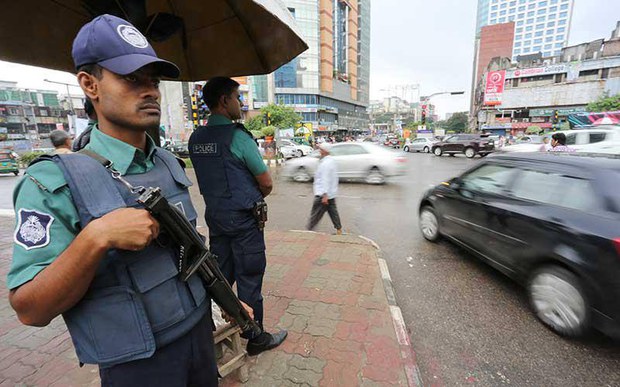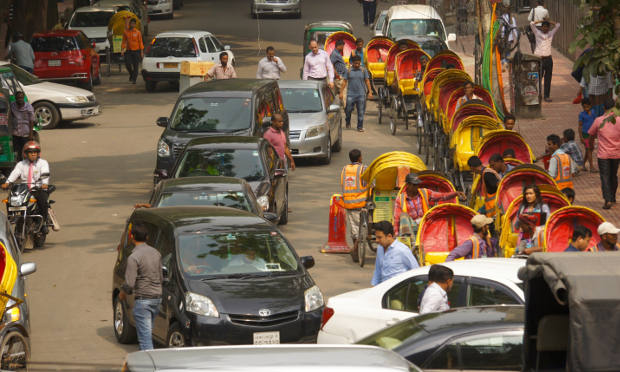Bangladesh: A Year After Café Attack, Foreigners Fret About Safety
2017.06.29
Dhaka
 Police monitor vehicles entering Gulshan, the diplomatic quarter of Dhaka, June 28, 2017.
Police monitor vehicles entering Gulshan, the diplomatic quarter of Dhaka, June 28, 2017.
Bangladesh has stepped up security in the year since terrorists attacked a café in Dhaka’s diplomatic quarter, but some diplomats and expats say the country still does not feel safe.
Citizens of five countries including Bangladesh were massacred with machetes during an overnight siege at the Holey Artisan Bakery on July 1-2, 2016.
Japan, Bangladesh’s single largest source of bilateral development aid, lost seven of its citizens in the attack.
“We had never expected any attack or killing targeting Japanese. Yet it happened,” Japan’s embassy in Dhaka said in a statement sent to BenarNews last week.
“Our perception of the security risk has not changed while law enforcement agencies in Bangladesh are working adequately to ensure security,” the embassy said.
“We see arms recovery each week and each month from various parts of the country. Many people are being arrested. Considering these developments, we think the security risk still exists.”
Apart from the seven Japanese murdered at the café, nine Italians, six Bangladeshis, one American citizen and an Indian were among 24 people killed during the attack claimed by the so-called Islamic State. Five Bangladeshi nationals who carried it out were killed separately by the nation’s security forces during a raid that broke the siege.
Sophie Aubert, the ambassador from France, which has suffered a string of IS-claimed attacks since January 2015, said both countries needed to remain vigilant against the terror threat.
“[T]hese violent events that we have lived [through] … in France, in Bangladesh and in other places in the world, have convinced me that the threat and insecurity will remain part of our lives, as long as we represent what the terrorists hate: a free, liberal, secular civilization, or in fact, being different from them,” Aubert told BenarNews.
According to Denmark’s envoy to Bangladesh, foreigners still worry that a Holey Artisan-type attack could happen again.
“We still have lot of restrictions on our own movement. We assess risks on a regular basis, and believe we are still at risk even 10 months after the attack,” Danish Ambassador Mikael Hemniti Winther told an event organized in May by the Diplomatic Correspondents’ Association of Bangladesh, according to the Dhaka Tribune.
‘A huge concern’
The French ambassador and other foreign officials in Dhaka praised the Bangladeshi government for its security efforts during the past year.
“In Bangladesh, we saw how the police cracked down on the terrorists, therefore lowering the level of the terrorist threat. Nevertheless, the foreign community, like other communities, remains aware that they may be targeted,” Aubert said.
“But the more you make it difficult for the terrorists to launch an attack against you, the better protected you are. That’s what everybody intends to do here, in order to have a normal life,” she added.
Rafiuzzaman Siddiqui, Pakistan’s high commissioner in Dhaka, commended Bangladesh for implementing measures to safeguard foreigners.
“The security situation always remains a huge concern for the diplomatic corps, especially those coming from the West. However, since the government of Bangladesh has taken necessary steps with regard to improvement in the security situation in Bangladesh, we feel safe and secure in Dhaka,” he said.
Not all expats share that view.
“There is an obvious increased police presence in Gulshan and Baridhara where most foreigners live. However, it doesn’t necessarily mean that these areas are more secure,” Elisabeth Oktofani, an Indonesian who lives in the Gulshan neighborhood where the attack occurred, told BenarNews.
“Since the Holey Artisan attack, there have been multiple suicide attacks on police and other targets, and it seems that every week these days there are significant counter-terrorism operations in one part of Bangladesh or another,” she said, adding, “It appears as though there are still dozens if not hundreds of more militants embedded in the Bangladeshi community. This doesn’t make the country feel safe.”
Inna Vechtomova, a Ukrainian living in the Gulshan area, disagreed.
“I do feel safe. But I keep in touch with my mission here and strictly maintain their suggestions to avoid any unwanted situation,” Vechtomova told BenarNews.
‘A new normal’
A high-ranking government officials suggested that non-Bangladeshis who are stationed in or living in the country needed to adjust to its security challenges.
“We have kept saying after the Holey Artisan attack that it’s a new normal. Everyone needs to adapt,” State Minister for Foreign Affairs Md. Shahriar Alam told BenarNews.
“I think diplomats are not that concerned over security issues as we have introduced various procedures regarding security aspects,” Alam added. “We have given them permission to stay in constant touch with police beyond the Diplomatic Security Zone. I hope this improved situation will sustain and will continue.”

A view of a street in Dhaka’s Gulshan neighborhood seen from the new location of the Holey Artisan Bakery café. [Courtesy of Elisabeth Oktofani]







